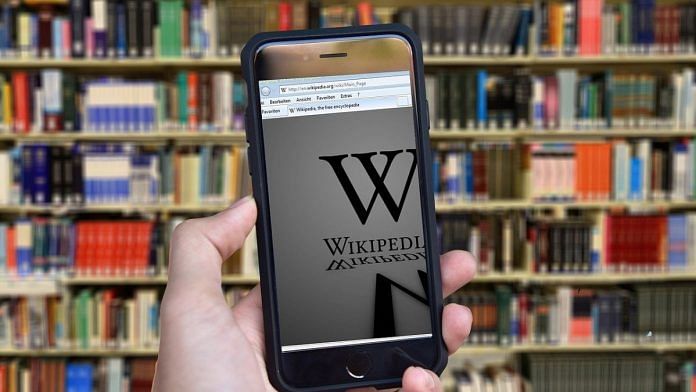Anna Mani was one of the most prolific scientists from India who made tremendous contributions to the field of atmospheric physics and instrumentation. She worked at the Indian Meteorological Department and was a member of the International Ozone Commission. The instruments and research developed by Mani and her team helped India predict the weather with precision and expand its meteorological field.
Today, on the occasion of International Women’s Day, we can celebrate the achievements of women like Anna Mani because their contributions are recognised and well-documented. At the same time, we must also acknowledge that our history remains incomplete as many women and their contributions are excluded or missing from public records.
Are women underrepresented on Wikipedia?
Wikipedia, one of the world’s largest knowledge resources, with 62 million articles in over 300 languages and 15 billion views per month, plays a crucial role in shaping our understanding of the world. It relies on content written by over 265,000 volunteer contributors worldwide (known as the Wikimedia movement), who add reliable information on the website based on verifiable sources and presented from a neutral point of view. Thus, content on the world’s largest online encyclopedia depends on the availability of existing published sources to verify the facts in its articles.
As women have been left out of historical narratives and traditional sources of knowledge, the issue is further reflected on Wikipedia, where women remain significantly underrepresented.
Today, only 19 per cent of Wikipedia biographies are about women. This means that, out of the almost two million biographies, less than 400,000 are about women. Similarly, while nearly half (49 per cent) of Wikipedia’s readers are women, only 13 per cent of active editors on Wikimedia projects identify as women.
To truly reflect the complexity and richness of the human experience, it is essential that Wikipedia actively engages and includes more content about and contributions from women — cis, transgender, and non-binary — from around the world.
This Women’s History Month, the Wikimedia Foundation, the non-profit that operates Wikipedia and other Wikimedia projects, is launching a new campaign, “Wikipedia Needs More Women“, calling on everyone to help close knowledge gaps on Wikipedia and beyond. This campaign celebrates the efforts of volunteers in the Wikimedia movement working toward closing the gender gap, and calls upon everyone to help change the stats by getting involved in gender equity initiatives and events happening around the world.
Also Read: More Indian women in STEM but few are becoming leaders. Hard to retain them in workforce
India can bridge the gap
India holds a key place within the ecosystem of Wikimedia projects, both in terms of readership and content contributions. With 1.3 billion page views per month, India has the fourth-highest number of views on Wikipedia. Further, of all countries in the South Asia region, India leads in content creation on Wikimedia projects, representing over 70 per cent of the region’s information on Wikimedia projects.
While India has the third-largest number of contributors to English Wikipedia after the United States and the United Kingdom, its volunteers contribute to 20 Indian language Wikipedia editions, comprising the largest set of languages represented on Wikipedia from a single country.
India has also been at the forefront of efforts to bridge the gender gap on Wikipedia and other Wikimedia projects. Last year, about 100 women contributors in the Wikimedia movement and thought leaders from 30 countries came together in India as part of a global conference, ‘WikiWomen Camp 2023‘. As a result, the group announced a comprehensive declaration for promoting diversity and inclusion in Wikimedia projects and shared key recommendations and next steps with the wider Wikimedia movement for consultation.
Over the past years, I have witnessed many inspiring Indian women volunteers taking steps to promote gender equity and enhance access to information, education, and women’s participation in the country. From a university professor creating workshops for her students to learn and edit on Wikipedia, to a medical doctor dedicating her volunteer time to create and improve articles on women’s health; from a senior citizen learning to edit Wikipedia on topics related to pharmacy, to a student taking up the challenge to create one article every day about a notable woman for 1,000 days — their contributions bring Wikipedia closer to becoming more reflective of our real world. The results are promising: In India, we have witnessed a steady growth of 13 per cent in content related to women on Wikimedia projects since 2021.
Wikipedia’s vision of sharing comprehensive human knowledge with everyone cannot be fully achieved without equitable representation of women. There are several ways that people can contribute and improve gender equity on Wikimedia projects — from editing a Wikipedia page to attending an online event or edit-a-thon. We also call on everyone — journalists, academics, thought leaders, individuals and organisations across the information landscape — to increase their coverage of women. This will help build out the ecosystem of secondary literature that Wikipedia volunteers rely on to create and improve content about women.
This Women’s Day, as we celebrate our progress, we also recognise the long road ahead and call upon everyone to help us. Together, we can close gender gaps, #ChangeTheStats, and make the internet a more equitable place.
Anusha Alikhan is Chief Communications Officer at the Wikimedia Foundation, where she leads strategy to advance understanding of Wikimedia projects and the Foundation’s values and social good mission across external, internal and community audiences. Additionally, Anusha is a writer and speaker on topics related to diversity, equity and inclusion in the nonprofit sector. You can follow her @AnushaA100. Views are personal.
(Edited Zoya Bhatti)



